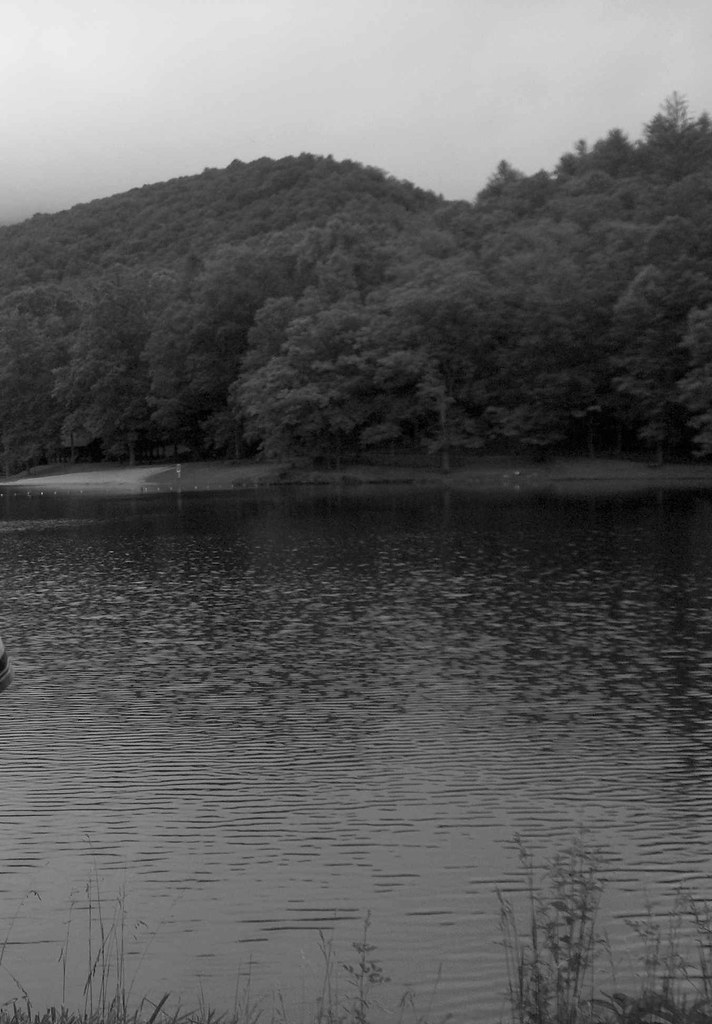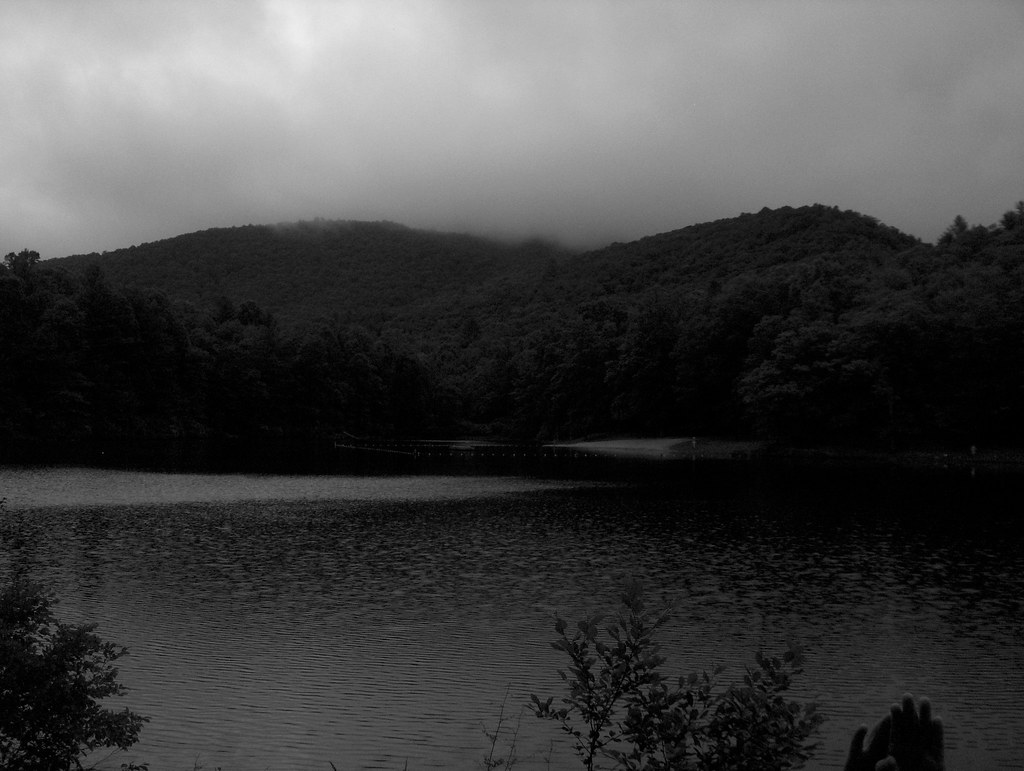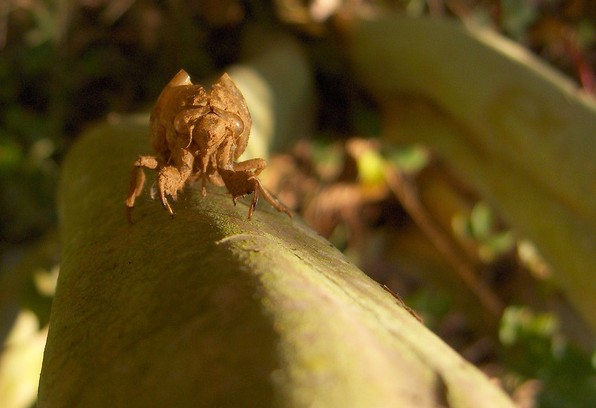27 June 2006
Another Reason to Prohibit Cell Phones in Classrooms...
The Ohoopee contacted Dr. Paddy Nobaddadie of the Southeastern Educational Research Group (SERG), an educational consulting company, for his response to the Italian report. He responded with, "We don't need school rooms filled with teenagers possessed of over-stimulated brains. I suspect expensive new editions of extra-somniative history textbooks will be required to offset this potentially dangerous situation. Perhaps a new shade of institutional brown for the walls would help as well. We have already begun the process of grant application to study this problem and expect results in six to ten years. One early trial balloon we are floating is Ritalin or a similar additive in the water supply. I mean, if fluoride hasn't destroyed our vital bodily fluids yet, why not Ritalin?"
The Committee to Reinvigorate Excellence in Education in the Public Schools (CREEPS), a special joint task force of the national educators' unions, have also expressed serious concern about the new research on the affect of cell phone use on the brain. CREEPS issued an immediate press release that calls for "significantly increased funding to address the impending collapse of the entire public education system if the effects of [fill-in-the-blank and delete this part] cell-brain stimulation (CBS) and the work of the current administration are not offset by large federal, state, and local distributions."
Peace
Survival of the Fattest? An Update
1. Inadequate sleep. (Average sleep amounts have fallen, and many studies tie sleep deprivation to weight gain.)
2. Endocrine disruptors, which are substances in some foods that may alter fats in the body.
3. Nice temperatures. (Air conditioning and heating limit calories burned from sweating and shivering.)
4. Fewer people smoking. (Less appetite suppression.)
5. Medicines that cause weight gain.
6. Population changes. (More middle-agers and Hispanics, who have higher obesity rates.)
7. Older birth moms. (That correlates with heavier children).
8. Genetic influences during pregnancy.
9. Darwinian natural selection. (Fat people outsurvive skinny ones).
10. Assortative mating, or "like mating with like," as Allison puts it. Translation: fat people procreating with others of the same body type, gradually skewing the population toward the heavy end.
Food for thought, so to speak.
Peace
26 June 2006
History Textbooks
For years I have struggled in vain to get my students to read their texts. I have assured them that there is vital information stored within the eye-catching pages of their hundred dollar tomes. I have tried pop quizzes, outlining, terms, questions, bonus points, oral quizzes, and concept mapping all with the same result: miserable failure.
The few students who actually read the text are unable to retain any meaningful information, and the vast majority figured out long ago that reading a history textbook may lead one to a fatal desire to insert round, metallic replicas of former presidents through one's eyes in hope of never having to read the abomination again, and, on top of that, one will learn little other than the fact that textbook publishing is a great gig. Recently, I have concluded that the best path (that is, the one of least resistance) is to teach students how to use their text as a reference work and to give up trying to force them to read it like a book since a thousand monkeys sitting at a thousand typewriters would quite likely create a book more interesting and informative than your average history textbook.
I bring this up because I am currently working on updating the reading assignments for my AP US History class. I am forced to complete this laborious task because we have had to update from the 5th to the 6th edition of Tindall/Shi's American: A Narrative History. It is a fine book and makes an excellent desk reference (I have a bunch of old editions for anyone who would like a free one).
The text is black and white, no words or definitions have been bolded, there are no review questions at the end of each chapter asking students who was the first oppressed minority to do something interesting, the text doesn't attempt to address the latest education fads with colorful sideboxs, little revisionist history finds it way into the book's interpretations of history, and it reads and looks like a decent book instead of a textbook. It also comes with the added bonus of being one of the cheapest AP US textbooks out there with a proven track record.
It is always interesting to see what cutting-edge historical research was deemed so important by the publishers as to warrant a new edition. So far, I have discovered that they have enhanced the brutal deprecations of white Virginia settlers against the Indians and themselves. Listen to this from page 54: "Severe even by the standards of a ruthless age, the code enforced a militaristic discipline needed for survival. When one laborer was caught stealing oatmeal, the authorities had a long needle thrust through his tongue, chained him to a tree, and let him starve to death as a grisly example to the community." Ouch. I don't remember that detail in earlier editions. And to think that some Americans today would be excited by such a punishment (the book doesn't report on the details, but I suppose it is possible the victim was wearing leather). Then the book describes an attack on an Indian village on the same page, "English soldiers attacked Indian villages and destroyed their crops." This is where a typical textbook would stop, but this one goes on: "One commander reported that they marched a captured Indian queen and her children to the river where they 'put the Children to death...by throwing them overboard and shooting out their brains in the water'."
The beauty of this book is that it does not focus merely on the sins of America [see Zinn, Howard], but also its successes. I know that by using this book I run the substantial risk of my students actually reading the book, enjoying it, and learning something. It is a risk I am willing to take. I look forward to what other gems they have inserted in this edition.
Peace
21 June 2006
Cell Phones in the Classroom: Can You Hear Me Now?
The first ten minutes of a movie are usually quiet and students actually watch the movie as they critically assess whether the material selected by the teacher actually merits their continued attention. After that, most students will turn their separate ways. Some will talk. Some will write notes to their loved ones. Some will catch up on sleep. Some will turn to electronic devices (generally cell phones and calculators, you wouldn't believe what you can do on a calculator these days). It is the teacher's job to make sure that none of that happens. On this day, most of the students are soon turned off by the Shakespearean dialogue and look for something else to do.
The school has a policy that allows students to possess cell phones, but that the cell phones must remain off and out-of-sight. Students caught in violation of this policy have their phones confiscated for the day, are assessed a $3.00 fine, and the parents are notified of the infraction. While some say that this punishment is a mere slap on the wrist, students really hate losing their phones for the day. If the phones are supposed to stay off and out-of-sight, why do they hate losing it for the day? The temptation is simply too great for a teenager to have a cell phone in his or her pocket and not to use it in some way. Students will exhibit urgent needs to use the bathroom, will text message without taking their phones out of their pockets (quite a talent), and even use them during movies when the dark gives them cover. The phones take pictures, record and show videos, play games, send and receive text messages, record voice mail, not to mention function as mobile phones.
As Romeo laments an unnamed Rosaline, the teacher notices a girl taking way too much interest in the contents of her purse. He waits a moment and the tell-tale glow of the cell screen briefly casts a pale-blue sheen across her face. He walks over to her; she is so involved in her text that she doesn't notice until he stands over her, watching her hunt and peck a message. She claims that her "received text message" light had gone off and thought it might be her mom with a message of vital import, could she check it? He takes it from her. She can get it at the end of the day. She was texting her boyfriend at another school about the boring movie that she was being forced to watch. Alas.
What are schools to do about the growing power and ubiquity of cell phones? They are powerful tools and convenient ways to transmit important information.
Two recent news stories highlight the unintended consequences of new technology. One, from CNN.com outlines the debate between the City of New York, which has banned student cell phones from school grounds and a number of parents who insist that their students have to have cell phones or they can't be good parents. The story can be found here. The second story, from Breitbart.com, reports on a new, high-pitched ringtone that is only hearable by the young and is the perfect tone for school use as the old, deaf teachers will not be able to hear it. This story can be found here. Older stories report on the use of cell phones for cheating, the inappropriate use of cell phone cameras in the locker room, and a host of other misdeeds enabled by the use of cell phones.
What did we do before cell phones?
Next on TOLN: "Ancient Discovery: Early Native American Shamans Disparage Students Use of New Smoke Signals; Children Burned, Obscene Messages Sent, Bugs Thrown in Fire"
Peace
Wednesday Miscellany
Whenever I think I might be becoming too narcissistic, I remember that I have a blog (which confirms it).
Next year I will be teaching: AP US History, Government/Economics, and AP European History. During the second week of July I will be attending a one week AP European Institute at Oglethorpe University. I will let you know how it goes. It will be a challenging year as we are also undergoing dual accreditation this year.
We watched Chicken Little for super-duper family movie fun night a few days ago. The children enjoyed it quite a bit and the adults got a few good laughs. The boy couldn't quite understand why we didn't buy it and why we have to return it. He grew a bit irate with me. A coupon for $1.99 movie rentals at Blockbuster for the month of June was beyond his understanding. The coupon also allowed me the pleasure of watching Serenity and The Great Raid, both fine movies. In addition, the wife and I watched Aeon Flux. Two dollars was too much to spend in renting that movie.
My current project involves the renovation of our downstairs bathroom. Instead of renting a wet tile saw ($44.00 a day), I spent yesterday using tile nippers to cut in the tile around the toilet flange (I hope the use of the word "nippers" doesn't put me at the end of any weird search results). The boy checked my progress about every ten minutes, and I ended up finishing the job but with blistered and sore hands today. Working around the toilet reminded me of my favorite ad for plumbing services: "A straight flush beats a full house!"
My watermelons continue to thrive. My most mature watermelon has reached almost seven inches. However, I can't seem to stop a feeling of impending doom...that some evil fungus or blossom end rot or a very large rabbit will destroy my lovely crop.
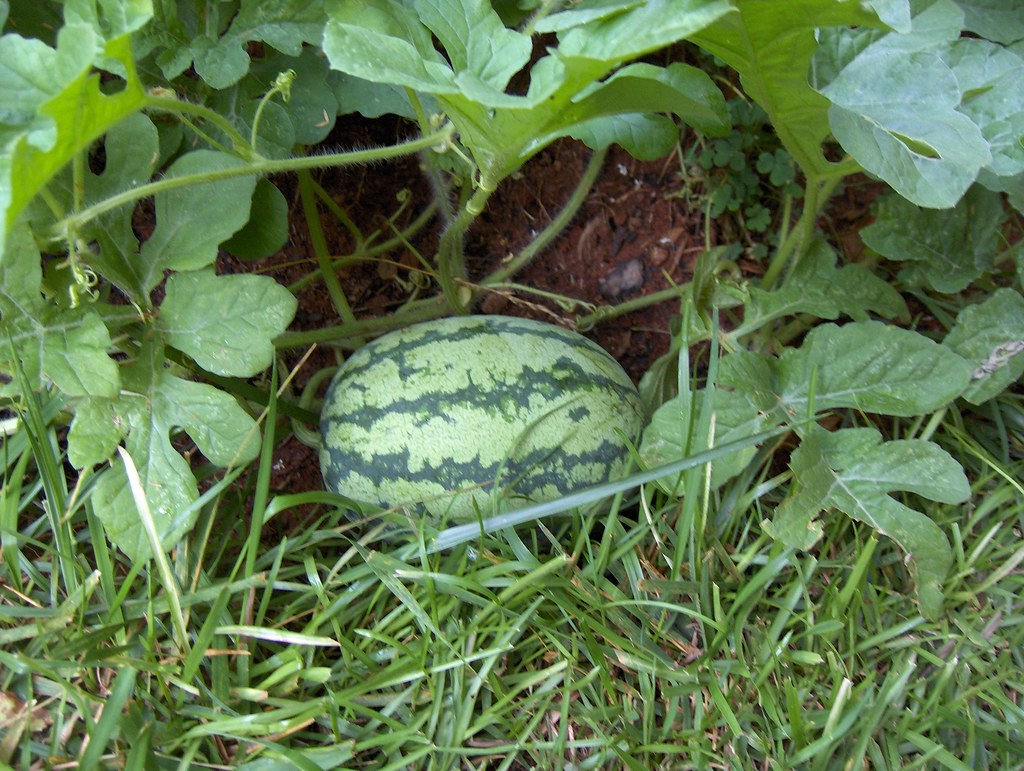
Peace
14 June 2006
What Stalks These Ancient Hills?
The day was overcast and cool, and the low clouds flung out by the remains of a tropical storm clung to mountains brooding over a lake where the stout Ohoopee staff photographer and his five-year-old boy fished for bluegill and trout.
A cage of crickets and tub of night crawlers purchased at the bait store, though they provided a moment of anguished anxiety for the boy, proved to be too tempting to the fish of Lake Winfield Scott. Our Ohoopee photographer deployed a fat night crawler on a number ten hook to land the first fish of the day, a handsome bluegill. Meanwhile, the boy used a bobber/cricket rig to bring in his first fish, another bluegill. A celebration of shark fruit snacks followed, setting the precedent for a snack after each caught fish. The boy was quite impressed to find out that his older cousin had caught his first fish at this lake (the photographer thinks) but was disappointed to discover that not only were there no mermaids in the lake but also that mermaids are pretend. After this, the stout one brought in a long stringer of sticks and seaweed while the boy finished the day with five fish and corresponding snacks.
Note the perfect lip hook. The fish was released unharmed.
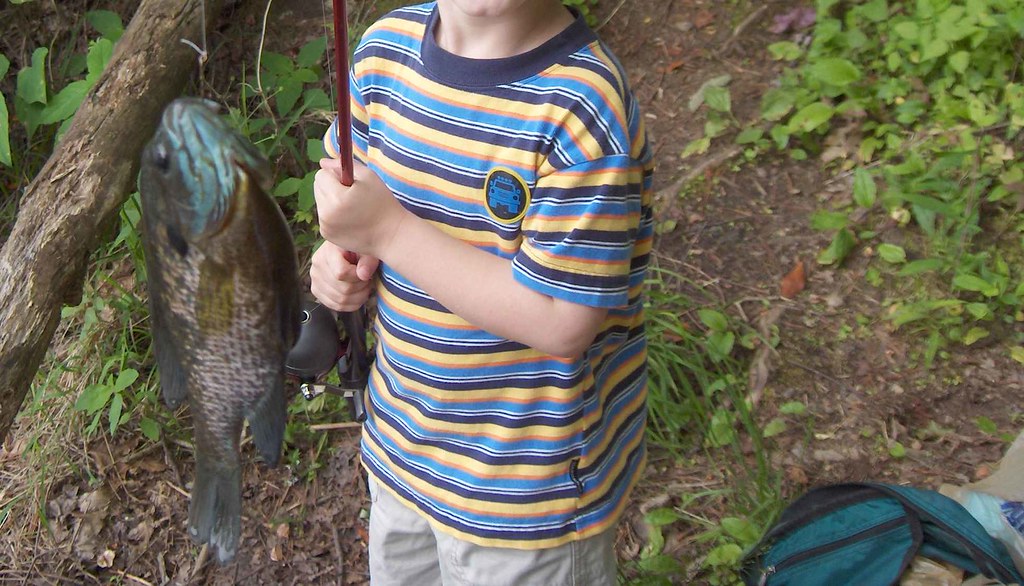
The day of fishing ended as soon as the boy showed the signs of FBS (full bladder syndrome) and boredom (he began to take his line out of the water to let his crickets "rest"). A National Forest Service outhouse was located conveniently nearby. The boy’s issues with using the bathroom have been previously recorded here, here, and here. He has matured quite a bit since then and demonstrated his new courage at the outhouse. The outhouse, a small, hexagonal building, consists of a crude plastic toilet over a hole in the ground opposite the door and appeared to have been last cleaned the last time a CCC work crew came through. He remarked, “Its kinda creepy in here” and did what he had to do.
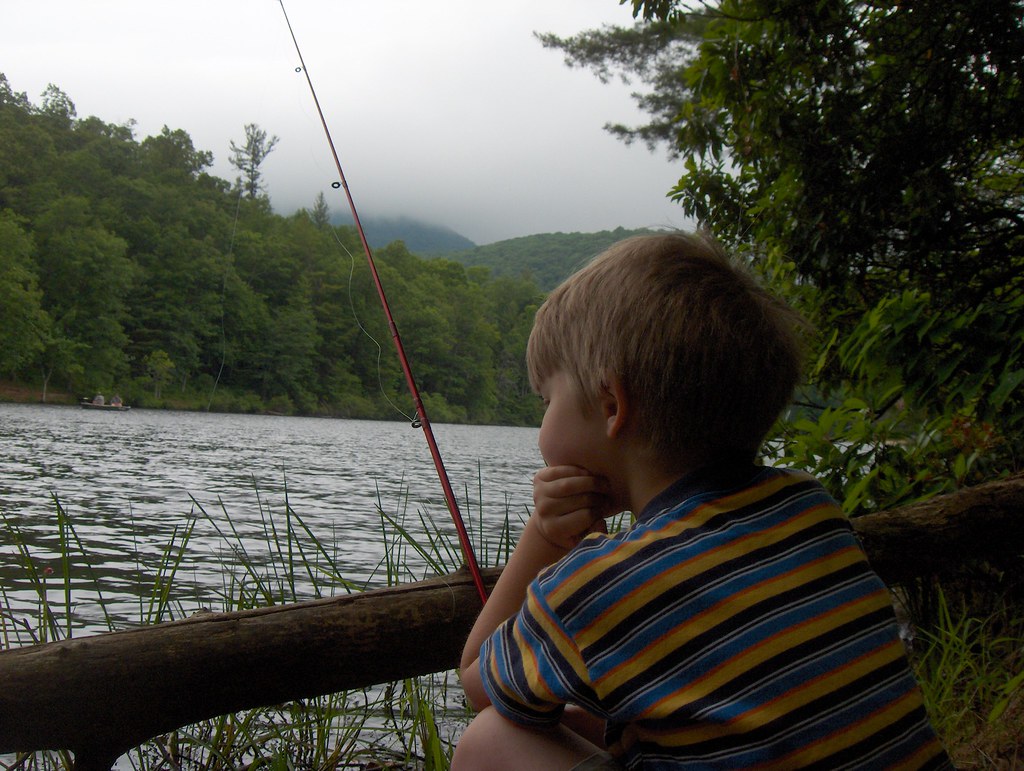
After a tour of the campgrounds, including a visit to historic site #27, where his cousin, uncle, father, and mother had all camped, the two struck out on a hike around the lake. It was about this time that our photographer noted that the park had emptied out. He thought it very strange that what had been a lake busy with anglers was suddenly desolate at mid-afternoon. Two lone souls drifted in a bass boat in the middle of the lake. The campsites were set up with tents but no one seemed to inhabit them. A light mist alighted on the fading mountain laurel as the two walked around the lake. Opposite the beach, our photographer, professional instincts noting a prime photo spot, snapped a few quick black and whites of the boy and the lake. At 4:06pm, he took a shocking pair of photos. Using the same settings and taken only moments apart, the photos are not only eerily different, but the second contains a detail both chilling and disturbing. Those of weak constitutions should not continue and should probably click somewhere like this.
Here is what our photographer found when he uploaded the photos to his computer that evening. The first photo has been cropped to remove the boy, though one can still see his sleeve at the left side of the picture. The picture shows a normal view across a normal lake on a cloudy day. The second picture, taken seconds later and not altered in any way, shows a horrifically changed landscape. Indeed, our photographer thought that someone had somehow played a prank on him by inserting a photograph of Camp Crystal Lake into his photo files. Once he realized that he had in fact taken both pictures, he began to look at both of them a little closer.
Picture 2003 (cropped; sleeve of boy visible on left side):
Picture 2004 (unaltered):
Close up of 2003 (note the white rocks on the shore):
Close up of 2004 (note to the right of the white rocks):
Negative of close-up 2003 (the white rocks are now black):
Negative of close-up of 2004 (the white rocks are black and so is something else):
The unseasonably cold weather, the unexplained darkening of the photo, the empty park, the strange apparition recorded on photo 2004: what can explain them all? Did Hurricane Alberto bring with it more than wind and rain or is the park permanently stricken with an unknown malady of the spirit? Are these former Indian lands still stalked by restless braves? Has the spirit of Winfield Scott returned to the park named in his honor to ensure that it is used in a way that honors him? The questions shall probably go forever unanswered. The editors of TOLN warns its readers to beware on the cold shores of Lake Winfield Scott.
Update: Since this story was posted, the Ohoopee photographer responsible for the story has sustained serious burns over his upper back and shoulders. Some say it was too long in the sun at the pool, but others say that the spirit world prefers to be left alone and those that seek to reveal its secrets can expect similar punishments.
Peace
12 June 2006
Harvest Day: Backyard Slaughter
Below is the spot I chose. It is just off the northwest corner of my house. In order to garden there, I had to remove the turf. This was the most challenging part of the work. It took about eight hours of work to remove squares of grass and transplant them to needful corners of the yard.
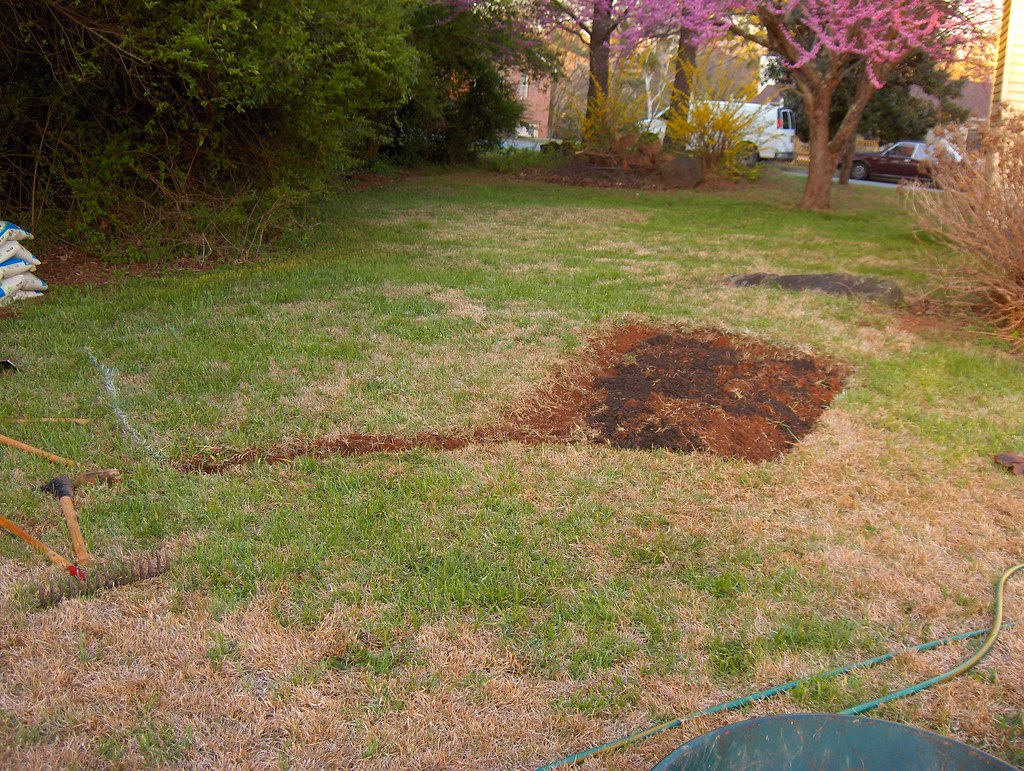
Eventually, I ended up with this (below). Yes, this is several days later and the brown car and white van are still in their same locations. My neighbors expanded their driveway in order to store more vehicles and still didn't have enough room. The orange cord in the lower right is the remnant of cable TV. Fortunately, we are on satellite.
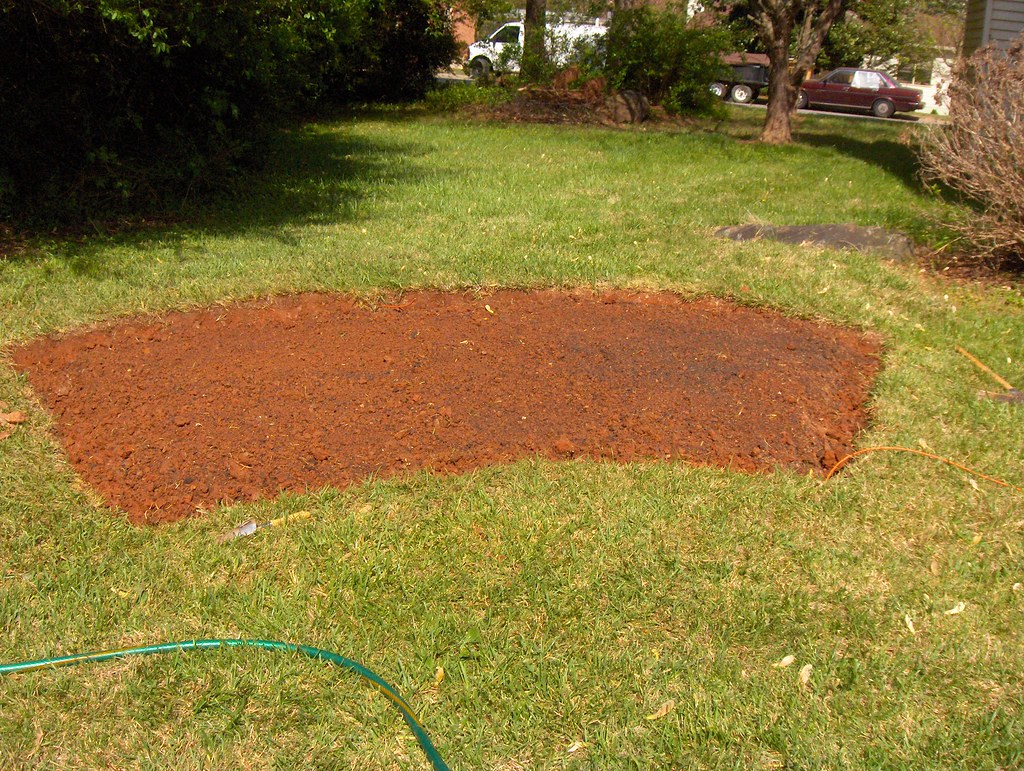
As soon as the plot was prepared, my silver maple tree provided the seeds: dozens of samara. Nature always has its own plans.
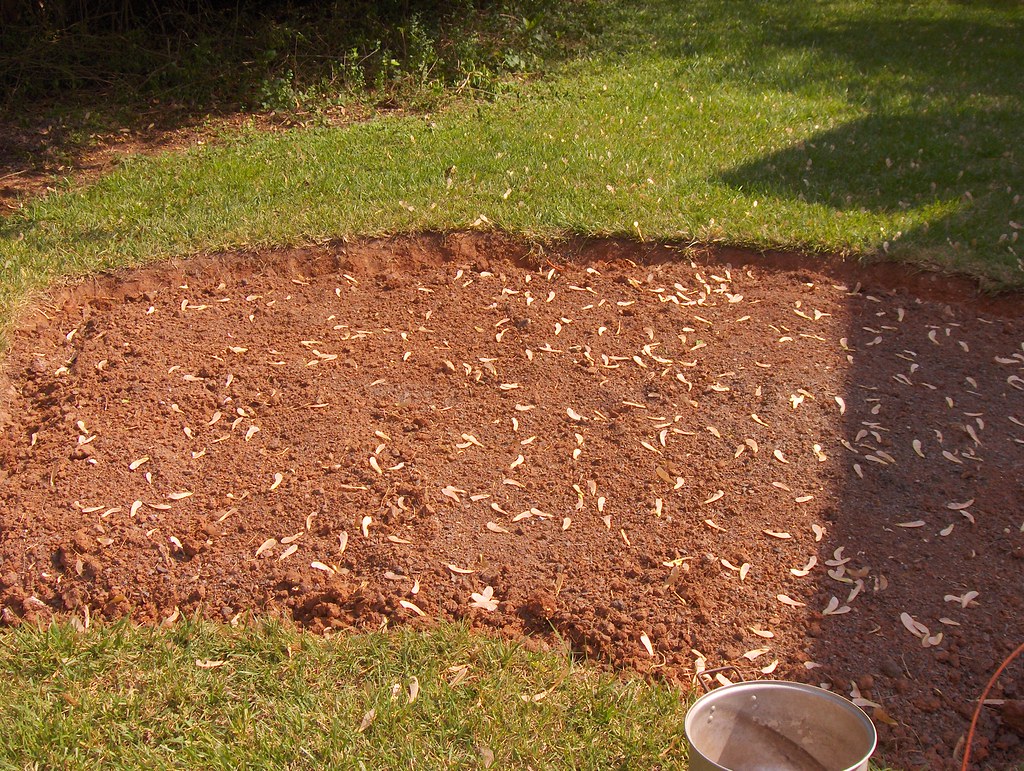
After mixing in manure, fertilizer, lime, and top soil, I laid out my plan. Three rows of beans, one row of cucumbers, three rows of corn, two tomato plants, and six watermelon plants interspersed among the corn.

Here is how things looked yesterday: The beans are yielding copious amounts (next year I will stagger the plantings two weeks apart so that only one row will bear fruit at any one time). I have harvested two cucumbers and will probably have one to two a day for the next two weeks. I have a number of grape tomatoes growing but not quite ripening. The corn is producing ears, but I fear it will be midget corn. I don't know what I did wrong, but the tallest stalk is less than four feet tall. The watermelon is growing like gangbusters, and there are several baby watermelons growing. It is all very satisifying.

Here is a closer look at my midget corn. Last year a neighbor employed three stalks of corn as an accent in their landscaping. The arrangement was dramatic and quite lovely. Corn is an impressing and attractive plant, and I would not be surprised to see it employed more as a landscape plant.

Below is one of my problems. My watermelon is growing wondrously. You can see a bud getting ready to bloom, a blossom ready for pollination, and a watermelon about the size of a fingernail in the lower left corner of the picture. Why is this a problem? All of the authorities say that a watermelon vine can sustain and grow to maturity about one melon for every three feet of vine. Which means I have to go through and individually destroy the weakest looking young melons; only the strong are to survive. I am only to leave the fruit that has the promise of the best future. It is a good thing we don't "select" children this way, although, I guess in a way many do (or wish we did).

I have always been a bit of a wimp when it comes to gardening. When planting seeds, the instructions always have you plant too many seeds for the area so that the weaker ones can be destroyed to leave room for the strong ones. Perhaps this explains why I am going to have too many cucumbers; I couldn't bear to pull up and cast aside a seedling. Two of the three melons in the above will have to be destroyed. How am I going to destroy such as beauty as the one below? Right next to it is a baby silver maple. I have to pull it up as well. All to insure the harvest of a few full grow melons.
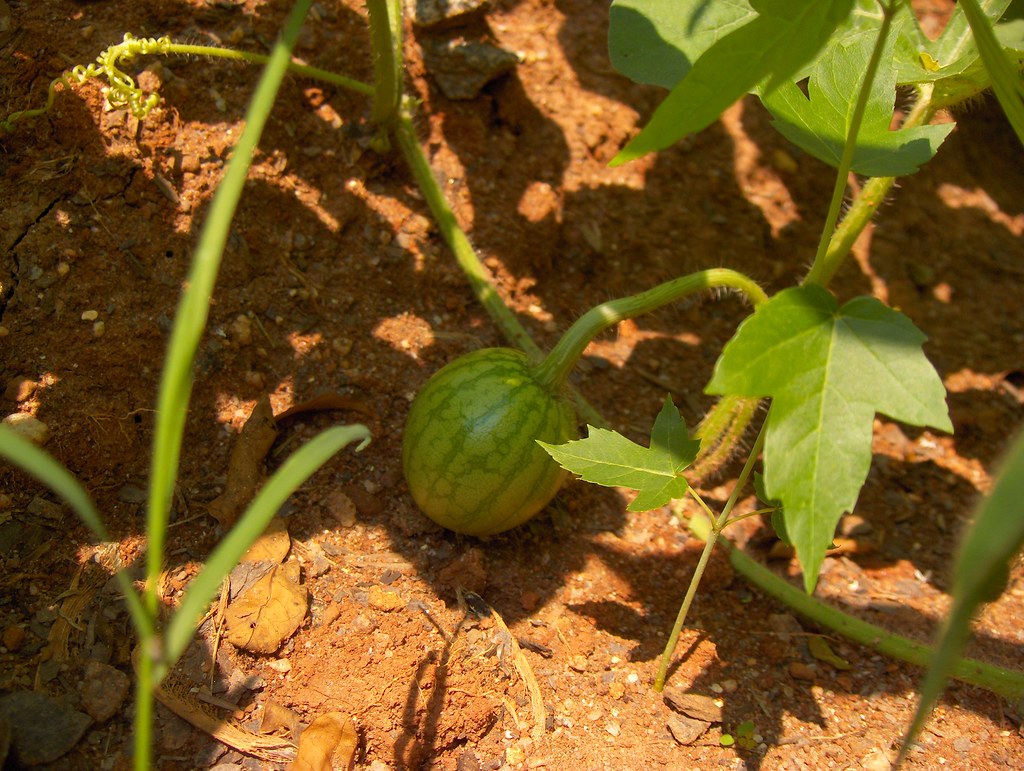
One begins a garden with hope in the ideal of bringing new green life into the world, but so much of gardening is destruction. That is what makes it a garden; it is controlled.
I am steeling myself to assert that control today. The red juice of many baby melons shall flow today like blood. The greater good shall be served by the slaughter of innocents. The weather calls for a chance of rain today, so maybe they shall be spared one more day; maybe I shall be spared one more day. Until then, I shall a use a sharp metal tool to remove the skin from a cucumber. I shall pour salt in its open wounds and enjoy every bite of it. Later, I shall immerse the green beans in a vat of boiling liquid and enjoy that as well.
Peace
